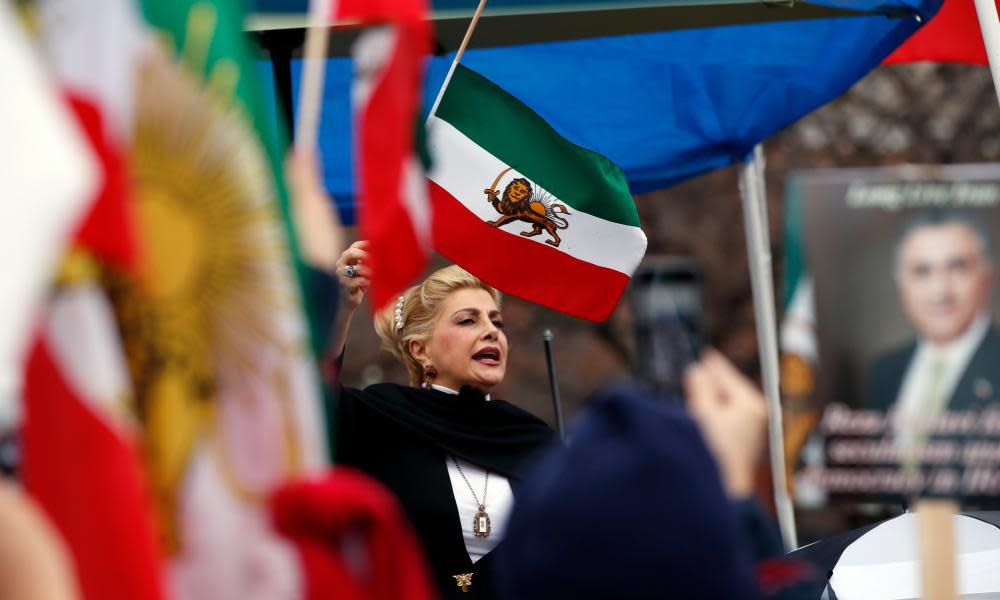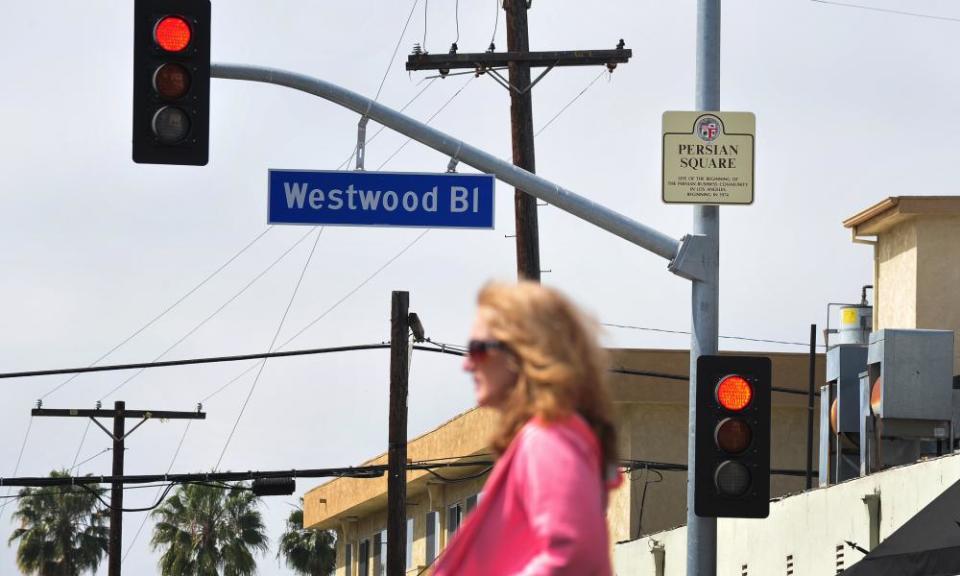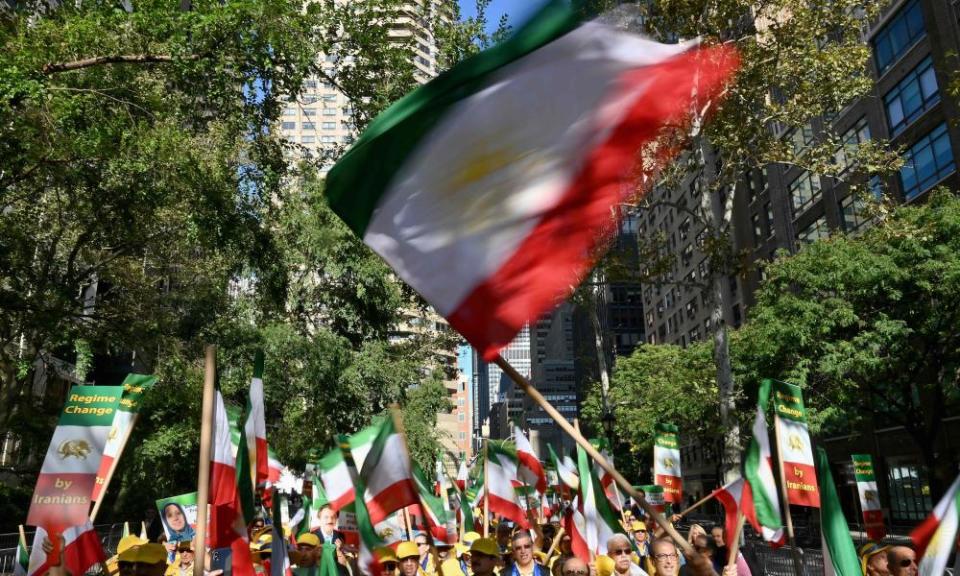Iranian Americans on edge as tensions surge: 'The fear is palpable'

Iranian Americans have for years wondered how long Donald Trump’s travel ban would keep them separated from their families. Now, they are questioning when the president’s actions might kill them.
Among the massive Persian community in southern California, which is home to the largest Iranian population outside of Iran, residents said the news of a US airstrike killing Iran’s most powerful general had caused them to experience panic and dread, flashbacks to childhood memories of war, and concerns that they may never see some of their friends and relatives again.
“The anxiety and fear is palpable,” said Niaz Kasravi, a Los Angeles-based advocate who came to the US from Iran in 1984 when she was nine. “Some of our generations have been through this so many times … Is this the start of a third world war?”
Related: For many Iranian-American families, this moment has us sick and terrified | Mitra Jalali
In the hours since Trump ordered the airstrike that killed the Iranian general Qassem Suleimani, Tehran has vowed to avenge the death, and pundits have predicted a new era of conflict in the Middle East. Meanwhile in LA, members of the city’s vibrant and diverse Iranian American communities said they were still trying to process the news and grapple with potential ramifications.
“It’s unsettling, because it’s one of those things where you cannot predict what happens,” said Shahin Motallebi, 58, as he was leaving Shaherzad, a Persian restaurant in the center of LA’s Little Persia, an enclave also known as Tehrangeles. “Everyone has family in Iran. Everyone is worried.”
On Friday afternoon, the Tehrangeles commercial hub on Westwood boulevard was bustling as usual. Families packed in the popular Attari sandwich shop eating kabobs, crowds gathered inside a Persian pizza shop and Persian ice-cream store, and people shopped at the local grocery stores and bookshops. The community grew in the 1960s and boomed after the 1979 revolution, with an estimated 500,000 people of Iranian descent now living in southern California.

Motallebi, an attorney who works in the neighborhood and came to the US in 1989 at age 29, said it was hard to trust the president: “He acts first and thinks about it later. I don’t think it’s well thought out.”
Standing on the corner across the street, Ali Asghari, 41, said it was clear to him that Iranian Americans were deeply divided: “Even among very like-minded Iranians, there are so many different opinions.”
Some are desperate to see a regime change and aren’t thinking about the consequences or what might come next, said Asghari, a software product manager who has been in LA for 19 years. Others are very skeptical of Trump’s decisions, he said: “I don’t know what is right or wrong, but I know people are suffering … People are so scared. It’s very emotional.”
For people who remember the lead up to the Iraq war and feeling helpless, we’re having that same moment again
Assal Rad
For some, the Trump administration has caused severe devastation with his travel ban targeting Muslim-majority countries, unveiled in January 2017, a week after his inauguration.
The reality of the ongoing and severe travel restrictions has made news of the airstrike all the more terrifying, said Paris Etemadi Scott, the legal director at Pars Equality, a group that provides services to Iranian Americans in California.
“It is an impossible situation,” she said, noting that some are panicked about how the escalating conflict could impact their families’ pending immigration battles. With parents, siblings, spouses and others in Iran barred from traveling to the US, some are afraid the president is ignoring the exacerbated hardships that could arise, she said: “The community is worried about this administration forgetting that there is a travel ban in place … A lot of people are glued to the TV and social media.”
Assal Rad, a research fellow with the National Iranian American Council who is based in Orange county, said there were a lot of divergent political beliefs in the community, but that many were united in their fears of war and death.
“For people who remember the lead up to the Iraq war and feeling helpless, we’re having that same moment again. It’s like that PTSD, a flashback to here we go again.”
Many Iranian Americans have grown accustomed to the tensions of their “dual identity”, hearing constant attacks from both governments, and living with fear, she said: “This feels very different. This is what we were scared of. The fear is coming to fruition.

“What people are worried about is not some battle between two states. What they are concerned about is the human cost,” she added.
There are also fears of increased harassment, discrimination and violence against Iranian Americans as tensions rise, said Kasravi, who is the director of the Avalan Institute, a research group. While US law enforcement officials, including the LA police department, have vowed to step up security measures, that’s not always comforting, given histories of unjust policing, she said: “I want my community to be safer, but I don’t want that safety to depend on a system that I know is not particularly effective or fair for all communities.”
Kasravi said the Thursday night news had also transported her to childhood memories: “I’m thinking about growing up during revolution and war … about the fear of that little girl woken up by sirens in the middle of the night.”
Pouya Alimagham, a lecturer and historian who was at home with his parents in Orange county when the news broke, noted that it was unnerving to watch US media programs feature rightwing thinktank heads and retired military personnel while largely excluding Iranian perspectives.
“We’ve been on a rollercoaster ride for months,” he added. “We’ve been talking about escalation for the past six months, and how this is going to lead to war … the war has already begun.”
Some in the community had a different perspective. Standing outside one of the Persian restaurants on Westwood Boulevard, Abe Oheb, 77, was playing Trump’s speech out loud on his phone.
“I’m happy this happened, because the guy who was killed did a lot of atrocities … It was a nice decision by the United States,” said Oheb, who came to the US from Iran 40 years ago. “Yes I’m Iranian … but I am American.”

